
African Hair Threading: History, Benefits, and How-To Guide
African hair threading, also known as Irun Kiko among the Yoruba people of Nigeria, is more than just a hair-styling technique. For centuries, it has been a symbol of cultural identity, creativity, and even status. While its roots lie in West Africa, this practice is now celebrated globally for its unique aesthetics and practical benefits. If you're looking for a hair care routine that not only protects your strands but also celebrates African heritage, African hair threading might just be your ideal solution.
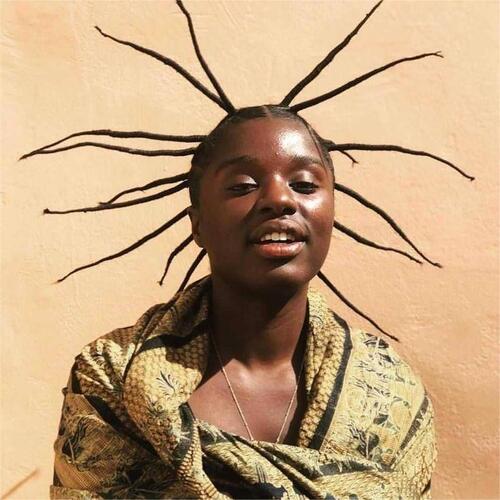
Source: Pinterest
What Is African Hair Threading?
African hair threading is a traditional West African method where hair is wrapped from root to tip with cotton or synthetic thread. Unlike braiding or twisting, the hair threading doesn't require extensions. Instead, the thread itself acts as both a styling tool and a decorative element, offering endless possibilities for creativity.
My grandmother used to say, “The thread is your friend; it stretches your curls without fire or chemicals.” And she was right. I remember sitting between my mum's knees as she threaded my hair, her hands moving swiftly, weaving stories of our family's Nigerian heritage into every wrap.
Benefits of African Hair Threading: Why It Matters
Black hair is pure magic—yet wonderfully delicate. I love my 4C curls, but daily heat styling and endless detangling? Absolutely exhausting. That's exactly why threading has captured my heart (and rescued my strands), and here is a before-and-after comparison.
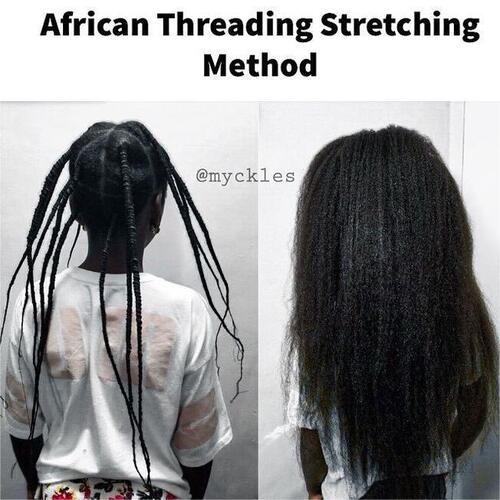
Source: Pinterest
✨ Ultimate Protection: Threading locks in moisture and shields delicate ends, so I'm not messing with split ends every morning.
✨ Zero Heat, All the Stretch: I've had too many close calls with flat irons, while threading just stretches my curls gently without any heat.
✨ Cultural Swagger: There's power in wearing a style your ancestors perfected. When I thread my hair into bold geometric parts, I'm not just styling—I'm honoring a legacy.
✨ Growth Booster: The light tension from threading can actually help reduce breakage and keep my length intact.
✨ Endless Creativity: From pineapple puffs to poodle-inspired loops, threading lets me sculpt my hair into artful shapes. One day it's sleek and modern, the next it's architectural drama—I'm always ready to switch it up.
How to Do African Hair Threading
Threading isn't hard, but it requires patience. My first attempt looked like a thread monster attacked my head—but practice makes progress! Ready to try this technique? Let's break it down.
Materials You Need
✅ Strong, smooth thread
✅ Spray Bottle
✅ Hair clips
✅ Leave-in conditioner or moisturizer
✅ A rat-tail comb
✅ Scissors
Step-by-Step Guide to African Hair Threading
Transforming your natural hair into a threaded masterpiece is easier than you might think. With just a bit of prep and patience, you'll be ready to thread your way to a stunning style.
Step 1: Prepare Your Hair
Start with clean, detangled hair. I use the LCO method (Liquid, Cream, Oil) to lock in moisture.
Step 2: Section Your Hair
Use a comb to divide your hair into manageable sections. For beginners, 6–12 sections often work well. I always part my hair into squares or triangles. For my collarbone-length hair, I prefer 10–12 sections.
Step 3: Measure and Anchor the Thread
Cut a piece of thread about twice the length of your hair section. Wrap the thread securely around the base of the hair and tie a knot to anchor it.
Step 4: Wrap It Up
Hold the thread taut and spiral it downward, covering the entire strand. Maintain even tension to avoid breakage.
Step 5: Secure & Snip
Tie a knot at the end, but don't forget to leave a little thread tail for easy removal. For added flair, you can join multiple threaded sections to create bubble hairstyles, loops, or intricate designs.
5 Bold Styling and Design African Hair Threading Hairstyles
Want to feel adventurous? Here's how you can get creative with your threaded styles:
Abstract Hair Thread
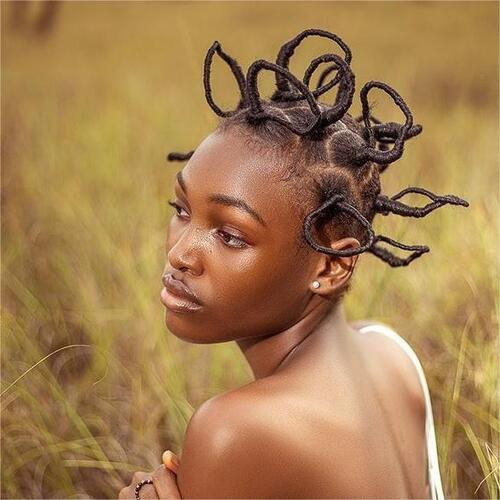
Source: Pinterest
A playful, avant-garde weave weaving contrasting threads into swirling patterns—bold geometry meets soft texture for an artful, head-turning statement.
Colored Thread with Puff
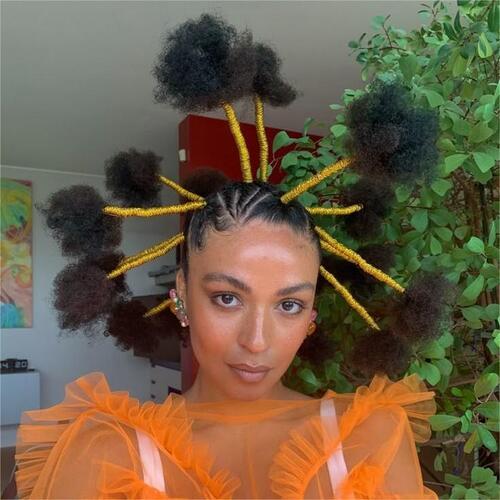
Source: Pinterest
Bright, vibrant threads wrap around sleek sections, leading up to a voluminous puff—fun pops of color crowned with chic, airy height.
The Basket Hair Thread
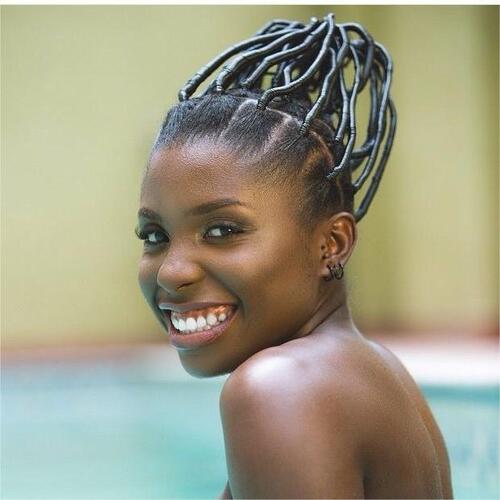
Source: Pinterest
Texture heaven! Threads weave horizontally like a handcrafted basket, offering 3D depth. Earthy yet intricate, it's a nod to ancestral craftsmanship. Totally a masterpiece!
Goddess Halo Hair Thread Style
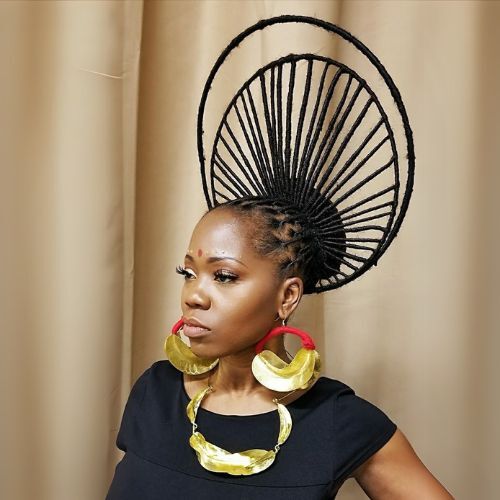
Source: Pinterest
Delicate threads form a radiant halo around the crown, evoking ethereal goddesses—romantic, luminous, and effortlessly regal.
Layered Hair Thread Style

Source: Pinterest
Cascading thread-wrapped layers add dimension and movement, with subtle color blends dancing through each tier for a dynamic, textured finish.
Cautions and Tips When Doing African Hair Threading
While African hair threading has amazing benefits, there are some important precautions to keep in mind:
❤ Tension Trauma: Too tight = sore edges. If your scalp throbs, redo it. My rule? If you can't smile comfortably, it's too tight.
❤ Moisture Matters: Threaded hair can dry out. Every 3 days, I spritz sections with rosewater + aloe juice.
❤ Switch it up: Avoid constantly relying on threading to prevent stress on specific areas of your scalp. Alternate with other protective styles like cornrows or twists.
❤ Removal properly: After three weeks at most, the stitches can be removed. My experience is not to pull the stitches, gently cut off the knot at the end, and then slowly untie it.
FAQs About African Hair Threading
What Does African Threading Do to Hair?
It's like yoga for your curls, which stretches them gently, reduces frizz and shrinkage, and keeps ends tucked away.
What's the Best Thread for African Hair Threading?
Soft, non-slippery cotton thread works best. I tried wool once… shudders. Stick to soft, non-slippery threads and avoid nylon or overly thick threads.
How Long Can You Leave African Thread in Hair?
2–3 weeks max. Longer periods risk tangling or dryness.
Does African Threading Damage Hair?
Not if you're gentle! But yanking threads or skipping moisturizer? That's a one-way ticket to Breakageville.
Summary
Whether you're stretching your hair, protecting it, or experimenting with bold new looks, there's no denying that threading is a timeless art form that beautifully marries tradition and innovation. Now it's your turn to try African hair threading. Celebrate its history, protect your hair, and get creative with styles that reflect your personality.